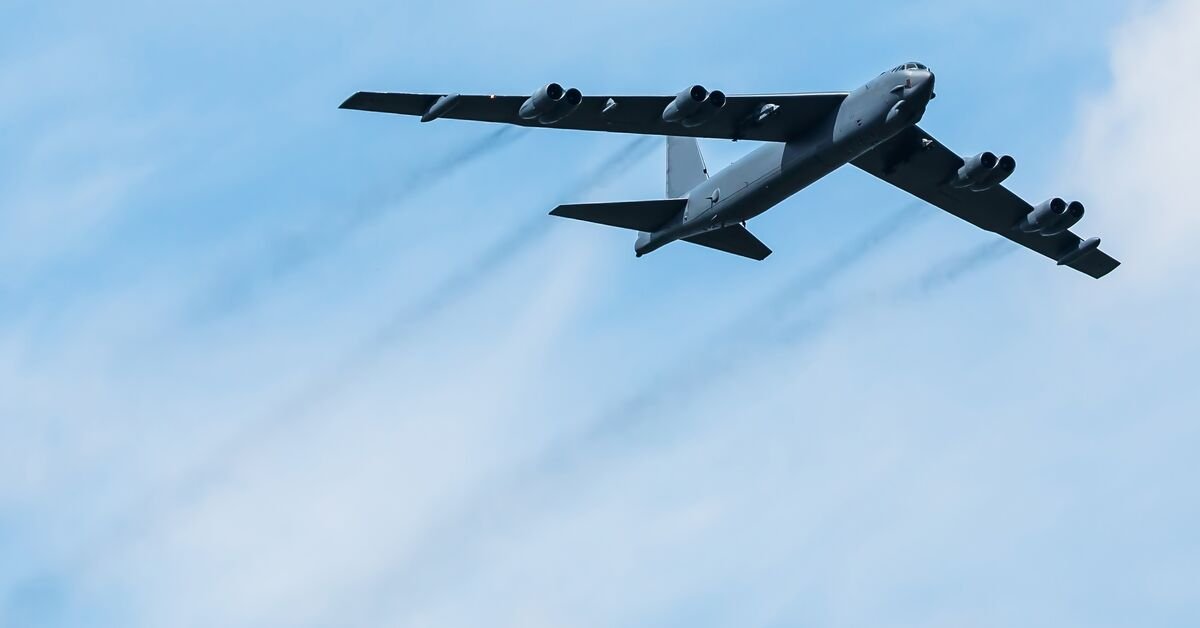WASHINGTON — The Pentagon sent another sortie of two US Air Force B-52 bombers over the Middle East this week as the Trump administration seeks to coerce Iran’s leaders into negotiations in a bid to halt Tehran’s nuclear enrichment.
The B-52 sortie was the third in just three weeks and comes as the aircraft carrier USS Truman returned to the Red Sea after a brief hiatus in the Mediterranean.
The Truman passed through the Suez Canal last week after undergoing repairs in Souda Bay, Greece, after colliding with a commercial bulk tanker near the canal’s north entrance last month. The latest bomber overflight, which has not been announced by the US military but was confirmed to Al-Monitor by a US defense official, was first reported by Al Arabiya.
Why it matters: The United States is ramping up its strategic strike capabilities in the region in a show of force in tandem with regional militaries. Israeli warplanes escorted the latest B-52 mission in an unsubtle signal to Iranian policymakers.
President Donald Trump signed a memo last month restoring his “maximum pressure” campaign of economic isolation against Iran. He has repeatedly said he seeks a peaceful diplomatic resolution to the Islamic Republic’s increased nuclear enrichment, but has warned the United States will not allow Iran to obtain a nuclear weapon.
Although Iran’s supreme leader, Ali Khamenei, has not authorized the pursuit of a nuclear weapon, the Iranian government has amassed some 274 kilograms of 60% enriched uranium since Trump withdrew from the multinational nuclear accord with Tehran in 2018, according to the latest reporting by the United Nations’ International Atomic Energy Agency.
On Tuesday, Trump’s nominee to be the Pentagon’s top civilian advisor, Elbridge Colby, vowed that if confirmed, he would provide Defense Secretary Pete Hegseth and the White House with “credible” military options to attack Iran’s nuclear program should diplomacy fail.
The United States and Israel have repeatedly war-gamed strategic long-range airstrikes resembling those officials say would be needed to damage or destroy Iran’s fortified underground nuclear facilities. Israel’s air force has neither the US-made GBU-43 bombs needed to penetrate the subterranean sites nor the warplanes capable of delivering them.
The deployments also come as US Central Command (CENTCOM) seeks to retain its access to Pentagon resources amid the transition to a new administration in Washington.
What’s next: Israeli leaders have been pressing the Trump administration in recent weeks to seize what they see as a rare moment of opportunity to disrupt Iran’s nuclear program.
The Israeli Air Force decimated Hezbollah’s top leadership and destroyed Iran’s strategic air defenses with standoff strikes launched over Iraqi airspace late last year amid fallout from the Oct. 7 war.
“Hezbollah was Iran’s insurance policy, and they lost it,” a person briefed on the discussions told Al-Monitor.
Under pressure: It’s not clear whether the pressure will bring the intended results.
Hard-liners in Iran’s parliament have ousted two key officials aligned with President Masoud Pezeshkian’s Reformist policies in recent weeks amid a severe economic downturn worsened by Washington’s sanctions regime.
Iran’s parliament impeached Finance Minister Abdolnaser Hemmati in a 182-273 vote on Sunday, as the rial continued to tailspin in value against the dollar. Similarly, Mohammad Javad Zarif, Pezeshkian’s vice president for strategic affairs and the country’s former foreign minister who played a key role in negotiating the 2015 nuclear accord, tendered his resignation overnight on Sunday amid pressure from hard-liners.
Iran’s president, Masoud Pezeshkian, expressed rare frustration in speech to parliament on Tuesday. The president, who ran on a platform of rapprochement with the West and dialogue with the United States over the nuclear issue, blamed Trump’s maximum pressure campaign for adding to the country’s economic woes.
“My belief was that talks are better, but the supreme leader has said we do not negotiate with the US,” Pezeshkian said. “We will proceed according to the direction of our top leader.”
Russia’s leader, Vladimir Putin, agreed to a request put forth by Trump to assist in outreach to Iran’s leaders in a bid to bring their side to the negotiating table, Bloomberg reported on Tuesday.
Know more: Another US military MQ-9 drone was shot down over Yemen this week, a US official confirmed to Al-Monitor.
The shoot-down, which the official attributed to the Houthis, came even as American military officials say the Air Force and Navy have held their own fire in accordance with the de facto ceasefire with the Yemeni rebels that has been in place since the Israel-Hamas ceasefire was reached.
The Pentagon has not publicly disclosed how many MQ-9s it has lost in the limited airstrike campaign against the Houthis. A US Navy F/A-18 fighter jet was shot down by friendly fire in December, but both pilots were recovered unharmed.
